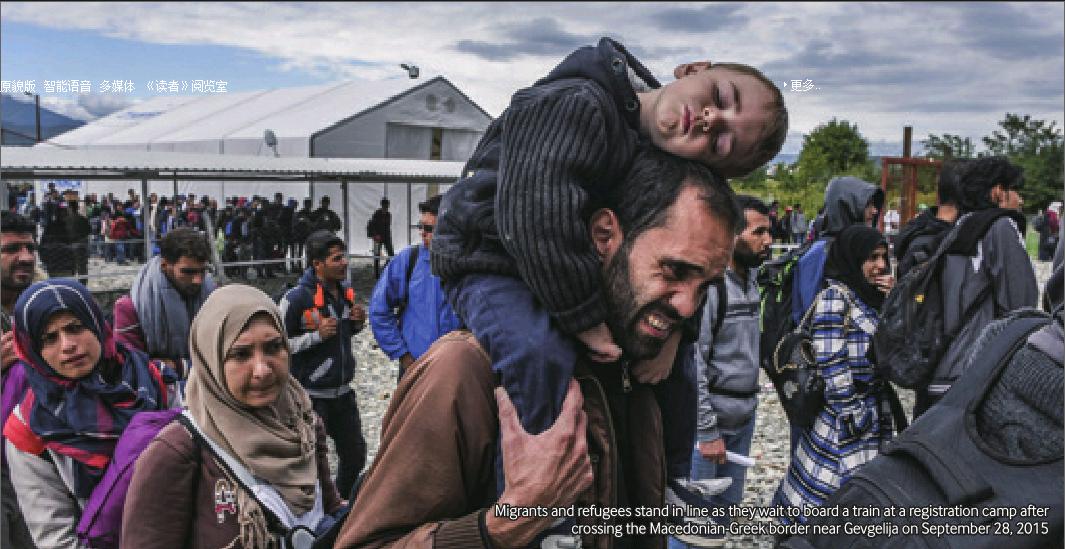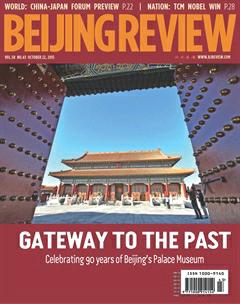Europe’s Predicament
2015-11-05ByChenYang
By+Chen+Yang

Europe is currently suffering the most serious migrant crisis since the end of World War II. Tens of thousands of refugees from the Middle East and North Africa are crossing the Mediterranean Sea into Europe, while thousands more others arrive through porous land borders.
Makeshift tents are everywhere in the streets of European cities such as Budapest, Munich, and Vienna. German Chancellor Angela Merkel has claimed that the refugee predicament is even more troublesome to the European Union than the disastrous Greek debt crises.
However, the humanitarian, economic and political emergency a mass migration creates didnt arise without warning—or without root causes—and relative to Europes capacity and abundant resources, the onset of refugees itself is not the only crisis.
Rather, the historical relationships between EU member states and the countries the migrants used to call home created a situation that would eventually lead to this summers mass exodus.
As a result of the attention on the EU as it struggles to come up with a coordinated, effective strategy for how to deal with the influx of refugees, Europes flaws have been made increasingly visible and the regression of leadership at and within the EU is increasingly transparent.
A region in chaos
Most of the recent migrants to Europe are from Syria or Libya and these refugees are the victims of the chaos that has erupted in the Middle East and North Africa (MENA) region over the last several years. Since the outbreak of upheavals in the region in 2011, Syria has been mired in a civil war; Libya continues to operate in a power vacuum; while Lebanon is in disarray both as a result of domestic problems and in reaction to the upheaval neighboring Syria has caused.
Moreover, countries across MENA are struggling to counteract the influence of the so-called“Islamic State” (ISIS).
Extreme terrorist groups such as ISIS are taking advantage of the anarchy currently pervasive in this part of the world, using the lack of effective national security apparatuses and desperation of millions to their advantage.
Human traffickers have also made a fortune of the chaotic situation in the region, charging staggering sums of money only to provide grim attempts at passage on unsafe, and often deadly, smuggling routes.
Nevertheless, it should be noted that the situations mentioned above have been exacerbated following both historical and continued intervention in the Middle East by Western powers.

The West has been involved in Middle Eastern affairs for over 100 years. Over the last several decades, their economic and political interests have expanded to the sphere of political systems, and with disregard for the historical,religious and cultural realities experienced by the Middle East countries, major Western powers have been trying to impose their own values and political systems on these countries.
Starting with the war in Afghanistan, then the Iraq War, quickly followed by intervention in Libya, Western powers worked to destabilize and remove incumbents in order to create new fledgling democracies. But in most cases the plans failed, fueling sectarian difference, inspiring terrorists, and leaving widespread antiWestern sentiment in their wake.
Where to go?
As a result of continuous war, unlivable conditions, and unimaginable violence, families across the MENA are rightfully fleeing their countries at all costs. Tens of millions of Syrian civilians have lost their homes, with an estimated 4 million fleeing abroad. Prosperous, safe and peaceful European countries naturally became their ideal destinations—if they have the means and the good fortune to get there.
This years wave of migrants also includes a large number of refugees from the Balkans. Although their lives are not threatened by war, many are not optimistic about their future.
Long-term economic stagnation in the region has left large swaths of local communities living in severe poverty. Tens of thousands of people are not able to meet basic living standards.
Unfortunately, the new session of the European Commission has frozen EUs eastern expansion plan for fear of “indigestion,” which means the window of opportunity to potentially join the EU for non-EU countries in the Balkans has been shut, further widening the wealth gap between these Balkan countries and their European counterparts.
Against this backdrop, many young adults in the region are willing to take enormous personal risks to try to sneak into the EU and become economic refugees. Although the EU has formally rejected the admission of these refugees, large amounts of people from the Balkans still make their way into the EU with unimaginable courage in their pursuit of safety, security, and a full stomach.
The EUs promise of equality and freedom has understandably created a magnet for refugees who are looking for a better life. However, Europes track record in the MENA has resulted in warring states leaving citizens helpless. Moreover, the EUs refusal of Balkan countries into its membership has only increased the motive for economic migrants to enter Europe themselves.
Thus, it is safe to say that it is EU itself that helped to increase the magnitude of the current migrant crisis, while its incapability to appropriately handle the widespread, multi-pronged crisis has only deepened its dilemma.
Continued mismanagement
Another troubling element of the mass migration story stems from the weak authority of the EUs institutions and its internal disputes. According to the Dublin Regulation, an asylum seeker has to apply for asylum in the first EU country they enter. Thus, the EU “frontline” countries take most of the responsibility for processing those refugees.
However, since the outbreak of the EU debt crisis, most EU “frontline” countries have been suffering from economic downturn and cannot afford to provide shelters for the migrants. Unwilling to serve as the “beachhead” of the EU, they began to encourage the migrants to flow into other EU member states, which has aroused fierce criticism from those EU members further afield.
With the surge of the migrant crisis, disputes within the EU are on the rise. For example, the open-border Schengen zone is at risk of closing; new fences are built in order to stem the influx of migrants.
While the EU powers such as Germany, France and Italy have agreed to accept migrants, they have also required EU members to relocate the refugees around the continent according to a states economic wealth and population.
Central and eastern EU members consequently worry that the relocation plan may become a long-term policy that affects their ethnic composition and will create a heavy—and perhaps unmanageable—economic burden.
The refugee crisis exposes a striking weakness in the structure of the EU as it fails to provide a united, coordinated response—and, most importantly, fails to provide for those in need.
Initially, the EU decided to accept 40,000 asylum seekers. However, when the refugees were assigned to their respective member states, the number was reduced to 32,000. When the suggested quota number was later increased to 120,000 in response to surging demand, the proposal was not accepted at the interior ministers meeting of the EU members.
The European countries originally planned to foot the bill of the migrant crisis themselves by setting up a special fund. Unfortunately, the EU, mired in severe debt crisis, seems incapable of giving support to even provide for their own.
Though the EU advocates the free movement of people, the decision-making power is still in the hands of the government of each member state. In the face of the mass influx of refugees, incongruity has become acute.
The incompleteness of European integration was highlighted once again after the outbreak of the European debt crisis. The internal rift of the European society became increasingly evident. As European Commission President Jean-Claude Juncker said, the European Union lacks both “Europe” and“union.”
Internal discontent
Some EU countries have shown humanity and displayed a keen sense of responsibility in their handling of the migrant crisis. Many European citizens have shown generosity through donations, volunteering, and assistance to refugees. Pope Francis even required every Christian parish to receive a certain number of refugees.
Despite these positive notes, the voice of opposition to receiving refugees continues to rise in many EU states. A chorus of anti-integration, nationalistic and xenophobic sentiments continues to grow. Case in point, in the first half of the year, the number of attacks on refugee camps in Germany climbed over 200.
Recently, anti-immigration demonstrations have taken place in Poland and other central and eastern European countries. Slovakia and Hungary publicly announced their refusals to accept non-Christian refugees. Meanwhile, polls show that the majority of French and German people are unwilling to increase the number of immigrants into their countries.
Fueled by a fear of “alien culture,” Europe is becoming increasingly conservative when it comes to immigration-related issues. Indeed, it is exceptionally difficult for the EU to make responsible and reasonable decisions related to accepting and arranging refugees, which reflects a tattered EU.
As Angela Merkel has said, the migrant crisis is an austere test to the self-proclaimed values of Europe. Unfortunately, in the face of this challenge, Europe did not produce a satisfactory answer.
